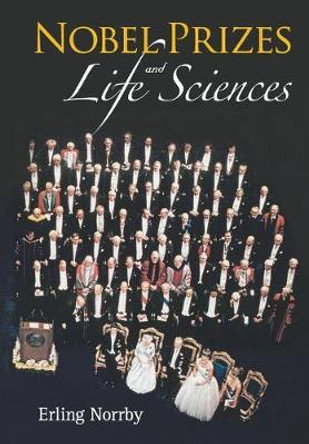Description
In 1989 Michael Bishop and Harold Varmus were awarded the Nobel Prize for their discovery that normal genes under certain conditions can cause cancer. In this book, Bishop tells us how he and Varmus made their momentous discovery. More than a lively account of the making of a brilliant scientist, How to Win the Nobel Prize is also a broader narrative combining two major and intertwined strands of medical history: the long and ongoing struggles to control infectious diseases and to find and attack the causes of cancer.
Alongside his own story, that of a youthful humanist evolving into an ambivalent medical student, an accidental microbiologist, and finally a world-class researcher, Bishop gives us a fast-paced and engrossing tale of the microbe hunters. It is a narrative enlivened by vivid anecdotes about our deadliest microbial enemies--the Black Death, cholera, syphilis, tuberculosis, malaria, smallpox, HIV--and by biographical sketches of the scientists who led the fight against these scourges.
Bishop then provides an introduction for nonscientists to the molecular underpinnings of cancer and concludes with an analysis of many of today's most important science-related controversies--ranging from stem cell research to the attack on evolution to scientific misconduct. How to Win the Nobel Prize affords us the pleasure of hearing about science from a brilliant practitioner who is a humanist at heart. Bishop's perspective will be valued by anyone interested in biomedical research and in the past, present, and future of the battle against cancer.
J. Michael Bishop has written his book 'to show that scientists are supremely human.' The book is also a lucid explanation of how science has been harnessed to fight the human afflictions of cancer and infectious disease. And the story ends with a wide-ranging overview of today's challenges to the scientific enterprise. Overall, a must-read for all those interested in science and scientists--even those with absolutely no interest in winning a Nobel Prize! -- Bruce Alberts, President, National Academy of Sciences J. Michael Bishop is that rare scientist who is widely read in literature and poetry. Most importantly, he remembers what he reads and thinks deeply about it, as well as about all else in his rich life. The Nobel Prize he won and richly deserved, his political activism, his understanding of cancer and microbiology, his devotion to the practice of science--all these provide fodder for his writerly craft. Quite a wonderful book! -- David Baltimore, Nobel Laureate and President, California Institute of Technology
About the Author
J. Michael Bishop, M.D., is Chancellor, University of California, San Francisco.
Reviews
J. Michael Bishop has written his book 'to show that scientists are supremely human.' The book is also a lucid explanation of how science has been harnessed to fight the human afflictions of cancer and infectious disease. And the story ends with a wide-ranging overview of today's challenges to the scientific enterprise. Overall, a must-read for all those interested in science and scientists--even those with absolutely no interest in winning a Nobel Prize! -- Bruce Alberts, President, National Academy of Sciences
Despite his book's encouraging title, Bishop--who won a Nobel Prize in Physiology and Medicine in 1989--cautions that "I have not written an instruction manual for pursuit of the prize." Instead, he has written an amiable reflection on the experience of being a Nobelist, intertwined with some history and anecdotes about the award, and balanced by a wide-ranging review of his own career as an "accidental scientist"...Along the way, Bishop reflects on the history of our knowledge of microbes, cancer, the politics of funding research and present-day disenchantment with science. His main purpose in writing this book, Bishop says, is to show that "scientists are supremely human"--which he does with grace and charm. * Publishers Weekly *
J. Michael Bishop is that rare scientist who is widely read in literature and poetry. Most importantly, he remembers what he reads and thinks deeply about it, as well as about all else in his rich life. The Nobel Prize he won and richly deserved, his political activism, his understanding of cancer and microbiology, his devotion to the practice of science--all these provide fodder for his writerly craft. Quite a wonderful book! -- David Baltimore, Nobel Laureate and President, California Institute of Technology
How to Win the Nobel Prize is typical Bishop: modest, funny, insightful and offering an extremely clear and brief explanation of the basic scientific achievement that won the 1989 Nobel Prize in physiology or medicine for himself and longtime colleague, Harold Varmus, now president of the Memorial Sloan-Kettering Cancer Center. -- David Perlman * San Francisco Chronicle *
In these pages Bishop reveals himself as a good writer blessed with enviable clarity, someone sensible and levelheaded who likes people and is enamored of his science. -- John Tyler Bonner * New York Times Book Review *
At its heart this analysis of science and the scientific world is a jewel. How to Win the Nobel Prize is an inspirational book, full of careful analysis and judgement. -- John Oxford * Times Higher Education Supplement *
Bishop is a gifted communicator and teacher, and he sets about his task of educating scientists and the public by describing his career in science and science politics...In the end, Bishop's book provides a road map for scientists and the public to build a robust scientific community that serves our society well. -- Andreas Trumpp and Daniel Kalman * Nature Cell Biology *
This book is a highly readable compilation of narratives by an erudite and eloquent biomedical scientist, Michael Bishop...This biographical sketch is replete with wise advice to young scientists (the importance of luck, timing patronage, resolve, and risk-taking)-and also very insightful about alternative routes to scientific discovery. -- Mel Greaves * Journal of the History of Medicine *
Awards
Nominated for PROSE Awards 2003 and Don K. Price Award 2004.
Book Information
ISBN 9780674016255
Author J. Michael Bishop
Format Paperback
Page Count 288
Imprint Harvard University Press
Publisher Harvard University Press
Dimensions(mm) 210mm * 140mm * 16mm







